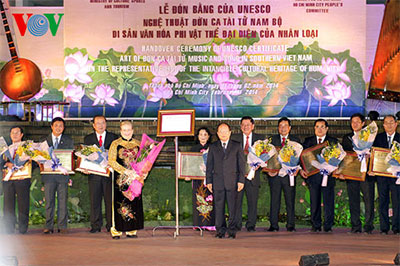Prime Minister Nguyen Tan Dung said on February 11 that preservation of traditional music forms assumes greater importance as the country deepens its international integration.

Every Vietnamese citizen should contribute to this important task, he said at a ceremony held in Ho Chi Minh City to mark recognition of tai tu music as an Intangible Cultural Heritage of Humanity by UNESCO.
The event was attended by leaders and artists of 21 provinces and cities that are home to the music.
PM Dung requested officials and artisans to implement with enthusiasm and a sense of responsibly the national action programme to preserve and develop the music form that developed in the southern region.
Reiterating that the preservation and development of "cultural values created by our ancestors" was imperative in the context of Vietnam's international integration, the PM expressed his appreciation for Vietnamese living at home and abroad for their contributions to preserving traditional art forms.
The international recognition that tai tu music has gained is a matter of honour for the people of Vietnam, he said.
At the ceremony, Katherine Muller-Marin, UNESCO Representative in Vietnam, handed the certificate to Minister of Culture, Sports and Tourism Hoang Tuan Anh.
She said tai tu music has helped bring people closer together and is an essential part of life of Vietnamese living in the southern region.
Tai tu, which originated in the 19th century, carried influences from the court music of Hue as well as folk music traditions in the south.
Handed down orally through many generations, the music is typically performed at festivals, death anniversary rituals and celebrations by farmer-artists.
The application for UNESCO recognition was submitted to the organisation in 2007, and a host of promotion activities were held in southern localities to increase the chances of approval.
Though the art form revolves around 20 principal songs and 72 classical songs, don ca tai tu instrumentalists and singers express their feelings through improvisation.
A tai tu orchestra is typically made up of young people who are friends or neighbours who get together after work to practice.
Amateur singers are usually accompanied by string and percussion instruments, including dan co (two-stringed fiddle), dan tranh (16-string zither), and dan bau (monochord).
Local officials and artists said that the UNESCO recognition will significantly contribute to exchanges between communities, musicians and researchers, and help raise awareness of the importance of preserving the nation's heritage.
Tai tu music is the sixth Vietnamese art form to have won UNESCO recognition as an Intangible Cultural Heritage of Humanity.
The others are Worship of Hung Kings in Phu Tho Province (2012); the Giong festival of Phu Dong and Soc temples in Gia Lam District, Hanoi (2010); quan ho singing in Bac Ninh province (2009); nha nhac (Vietnamese court music) in Hue imperial city (2003); Xoan singing in Phu Tho province (2011); Ca tru singing (2009) and gong culture in the Central Highlands (2008).